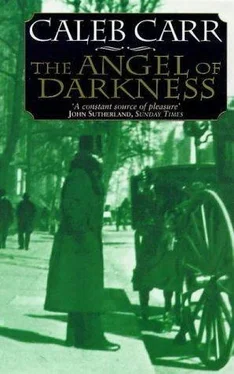Caleb Carr - The Angel Of Darkness
Здесь есть возможность читать онлайн «Caleb Carr - The Angel Of Darkness» весь текст электронной книги совершенно бесплатно (целиком полную версию без сокращений). В некоторых случаях можно слушать аудио, скачать через торрент в формате fb2 и присутствует краткое содержание. Жанр: Детектив, на английском языке. Описание произведения, (предисловие) а так же отзывы посетителей доступны на портале библиотеки ЛибКат.
- Название:The Angel Of Darkness
- Автор:
- Жанр:
- Год:неизвестен
- ISBN:нет данных
- Рейтинг книги:5 / 5. Голосов: 1
-
Избранное:Добавить в избранное
- Отзывы:
-
Ваша оценка:
- 100
- 1
- 2
- 3
- 4
- 5
The Angel Of Darkness: краткое содержание, описание и аннотация
Предлагаем к чтению аннотацию, описание, краткое содержание или предисловие (зависит от того, что написал сам автор книги «The Angel Of Darkness»). Если вы не нашли необходимую информацию о книге — напишите в комментариях, мы постараемся отыскать её.
The Angel Of Darkness — читать онлайн бесплатно полную книгу (весь текст) целиком
Ниже представлен текст книги, разбитый по страницам. Система сохранения места последней прочитанной страницы, позволяет с удобством читать онлайн бесплатно книгу «The Angel Of Darkness», без необходимости каждый раз заново искать на чём Вы остановились. Поставьте закладку, и сможете в любой момент перейти на страницу, на которой закончили чтение.
Интервал:
Закладка:
“Well, of course, but-”
I didn’t turn, but I could tell that Miss Howard was probably shaking her head in disappointment; I hoped she wasn’t going for the derringer. “But you were a boy ,” she said, fairly bitterly. Marcus didn’t answer-he didn’t have to. “Which means that girls don’t have destructive or angry thoughts,” Miss Howard went on, “and so never dream of having the power to embody them. Correct?”
“Well,” Marcus answered, a bit sheepishly, “when you say it like that , it sounds fairly stupid.”
“Yes,” Miss Howard answered, “it does.”
“And it is,” the Doctor added. “My apologies, Detective Sergeant. But, as Sara said to me, look at the paradoxical examples young girls are offered when growing up-they are taught, on the one hand, that theirs is the pacific, nurturing sex. No outlet is provided for their feelings of anger and aggression. Yet they are human-it is, as Sara says, no more than stupidity to believe that they don’t experience anger, hatred, feelings of hostility. And as they do, they also hear different sorts of stories, from oblique sources-mythology, history, legend-of cruel goddesses and wanton queens, whose very creative or supreme power permits them to indulge in rage, revenge, and destruction. What lesson would you take from it all?”
There was a break in the talk, and then Lucius said, very softly, “The iron fist in the velvet glove…”
“Detective Sergeant,” the Doctor said good-naturedly. “I don’t believe I’ve ever heard you come so close to poetry. An excellent image, truly-is it your own?”
“Oh. No, I”-Lucius squirmed a bit-“I think I heard it somewhere.”
“Well, it fits admirably,” the Doctor said. “Deadly anger, hidden behind a veil that approximates as closely as possible our society’s notion of ideal, or at least acceptable, feminine behavior.”
“That’s very neat,” Mr. Moore said impatiently. “But it still doesn’t answer the question: Why, if you’re feeling all this shrouded anger, do you decide to go out and be a mother, or a natal nurse, or kidnap somebody else’s kid to take care of it like it’s your own? Doesn’t sound very angry to me.”
“We’re not suggesting that it is, John,” Miss Howard said. “Not at that stage. Taking care of the child is the manifestation of the first half of the character-the one that’s acceptable, the one that’s responding to the constant statement that women are supposed to be nurturing, and aren’t fulfilling their basic role if they’re not. That’s when the transference of ego occurs.”
“Okay,” Mr. Moore said, now pounding one foot on the step of the carriage so that the whole thing shook. “So where the hell does all this ‘evil goddess’ garbage come in?!”
“Let me put a case to you, John,” the Doctor said. “You are such a woman. You have perhaps had your own children, but lost them-through disease, mishap, any number of misfortunes that may or may not have been your fault, but have certainly left you feeling that your own most basic role in life and in society has been taken away. You’ve been left to feel utterly worthless, even to yourself. So you find other ways to care for children. You become a nurse. But something happens-something that threatens your renewed ability to fulfill your primeval function. Something that enrages you so that you feel-to use Marcus’s term- entitled to become the wrathful, primitive goddess, the taker as well as the giver of life.”
“And what is that something?” Mr. Moore asked anxiously, suspecting, now, that an answer was close.
We’d reached Twenty-third Street, and were passing, on the northwest corner, the old, decaying Grand Opera House. Bolted to its Eighth Avenue side was a huge, ugly sign composed of electrical light bulbs what spelled out the hall’s current entertainment staple: VAUDEVILLE.
I heard the Doctor say, “Ah, the old Grand,” in a voice that made me wonder if he was truly recalling fond memories or was just tormenting Mr. Moore. “There used to be some marvelous productions in there…”
“Kreizler!” Mr. Moore was reaching his limit. “ What is that something?”
The Doctor’s voice stayed quiet: “Sara?”
“There’s really only one possibility,” Miss Howard said. “The children don’t cooperate. At least, from her point of view they don’t. She tries to nurture, but they don’t accept it. They cry. Develop health problems. Reject her attention and her care, no matter how much effort she puts into it. She tells herself it’s their fault. She has to. Because the alternative-”
Mr. Moore finally picked it up: “The alternative-is to admit that she has no nurturing skills.” He let out a low whistle. “My God… do you mean to tell me that this woman has structured her whole life around something she can’t do ?”
“Given the way that she has, in all probability, been raised,” the Doctor said, “what choice has she? In the face of failure she must always try again, with another candidate and even harder.”
“I wonder, John,” Miss Howard added pointedly, “if you understand how truly difficult, how unbearable, it is to be a woman and acknowledge that you have no talent for maternity, in this society. In any society. How can most women acknowledge such a thing even to themselves? Oh, you can choose to say that you won’t be a mother-but to have it openly displayed that you can’t ?”
Mr. Moore had to give that a minute; and when he came back to the conversation, it wasn’t very gracefully. “But-well, I mean-why can’t she? What-well, what’s wrong with her?”
I was sure I could hear the derringer cocking at that point; but it was only Miss Howard’s clicking tongue. Feeling compelled to turn around, I saw the others staring in amazement at Mr. Moore. “You really are insufferable sometimes, John,” Miss Howard spat out. “That’s a marvelously enlightened attitude. ‘What’s wrong with her?’ Why, I ought to-” She balled a fist, but the Doctor stayed her hand.
“ If , Moore,” he said, “by ‘what’s wrong with her?’ you in fact mean, what context could possibly have produced such a woman, then that is what we must determine. And the process won’t be helped by presuming fault or evil on the woman’s part. Remember-we must, as we did in our last case, try to see the situation through her eyes, understand it and experience it as she must have.”
“Oh.” Mr. Moore’s voice had grown what you might call contrite. “Yes. Right.”
“We’ve reached Fourteenth Street,” Lucius announced. “Just a few blocks to Bethune.”
Turning west on Fourteenth and heading for Greenwich Street, we started to make our way past the shuttered packing houses of the meat district, where the stench of blood had so completely seeped into every cobblestone and building over the years that even on a pleasant, cool Sunday afternoon it was very noticeable: not exactly a good omen for what lay in front of us. Once we were south of Horatio Street on Greenwich, the structures around us turned back into residential houses, some three and four stories tall, some just old two-story jobs with dormers what seemed almost as big as the houses themselves. Trees of varying sizes and ages lined the blocks, and some of their branches had reached clear out into the street, only to be snapped off at the ends by passing traffic.
As we moved through all this scenery, we began to discuss what strategy we should adopt once we arrived at Number 39 Bethune Street. The first move, made at the Doctor’s suggestion, was for me to draw Frederick up to a halt and jump down to raise the cover over the calash’s seat. Since not all of us were going to knock on the Hunters’ door-that would’ve looked a bit ridiculous-it would be best for those what stayed behind to be out of sight. That figured to be me, Cyrus, and at least one other person; and as we got back under way, it looked like Miss Howard was the only logical choice. Everybody agreed the detective sergeants should take the lead, and that the Doctor should accompany them: if Nurse Hunter and her husband still lived at Number 39 and were at home, it would be best to let Lucius and Marcus take a strict law enforcement line, being as the Linares child would probably be somewhere in the house and fairly easy to locate. And on the chance that the child needed medical help, the Doctor should be right there.
Читать дальшеИнтервал:
Закладка:
Похожие книги на «The Angel Of Darkness»
Представляем Вашему вниманию похожие книги на «The Angel Of Darkness» списком для выбора. Мы отобрали схожую по названию и смыслу литературу в надежде предоставить читателям больше вариантов отыскать новые, интересные, ещё непрочитанные произведения.
Обсуждение, отзывы о книге «The Angel Of Darkness» и просто собственные мнения читателей. Оставьте ваши комментарии, напишите, что Вы думаете о произведении, его смысле или главных героях. Укажите что конкретно понравилось, а что нет, и почему Вы так считаете.











